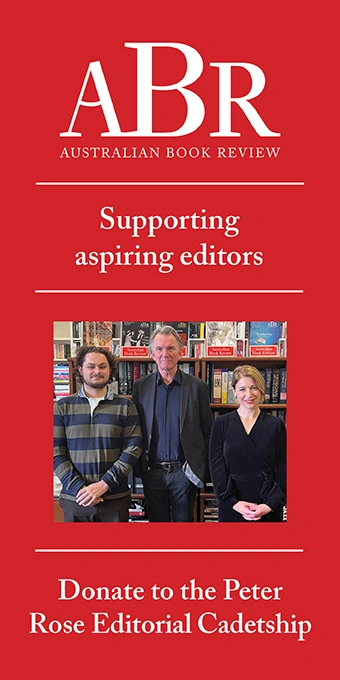Kate Ahearne
Kate Ahearne is a Melbourne writer and critic.
There’s something very special about the pozzie occupied by small magazines in the immensely complex structure of any modern society. From the surreptitious and dangerous distribution of broadsheets in countries less fortunate than our own, to the high-gloss high-chic and/or High Culture mags that emanate from the ‘top end’ of more comfortable societies, they keep groups of likeminded folks ... (read more)
By now most of us already know, whether we’ve read it or not, that Peter Carey’s new novel, Oscar and Lucinda, is about God, glass and gambling, and that in the last few pages a glass church floats up the Bellinger river. We know because the book has been reviewed in just about every major newspaper and magazine in the country. There have been speeches and public appearances, extracts, profile ... (read more)
It must have seemed as natural to Penguin as money in the bank to ask Helen Gamer to provide a few enticing words for the cover of Jean Bedford’s new book, Love Child. Here, it would appear, is a book very much in the Garner backyard – short, domestic, ‘certainly not ‘loud’ or attention-seeking, but nicely crafted.
... (read more)
If your interest in Australian literature predates its current flavour-of-the-month status, no doubt there exists, somewhere in your dinner-party repertoire, a screechingly funny reminiscence from the long ago, that winds up with some pompous professor of literature, or some arrogant publishing mogul, delivering the punchline, ‘Australian literature? Guffaw guffaw. I didn’t know there was any ... (read more)
There must be something horribly deformed about a society in which the lowest paid work is often the most demanding and the least dispensable. Why, for instance, is the wellbeing of our elderly not worthwhile enough for people to be paid to deliver Meals on Wheels? Who doesn’t believe that the nurture of children is an enormously responsible job? Does a rubbish tip attendant get better paid than ... (read more)
The idea of the sequel probably goes back to the earliest cave drawings in the bowels of the oldest hills. ‘What happened next?’ was surely .among the first words babies ever gurgled as parents grunted bedtime stories around ancient camp-fires. It is not given to the armchair anthropologist to know whether· ‘What happened before that?’ is quite so fundamental, but I suspect not – o ... (read more)
The first idea I remember having about the past as history was that people were more brutish then and more unjust because they were more ignorant. History was progress. This was the enlightened age.
I was about nine at the time, a boarder at a Catholic convent in Gippsland, but my naive notions of history were still shared by many historians. I had already devoured the ten volumes of Arthur Mees ... (read more)
Reading Frank Moorhouse is a bit like learning to cook silver beet in some newfangled way and discovering that for years you’ve been chucking the best bits out.
Most of us, even at this distance from Einstein, are still wanting there to be An Answer, a firm Truth, no matter how complex or ambivalent, to set up against all those other ‘truths’ held just as firmly by everybody else. Moorhouse ... (read more)




